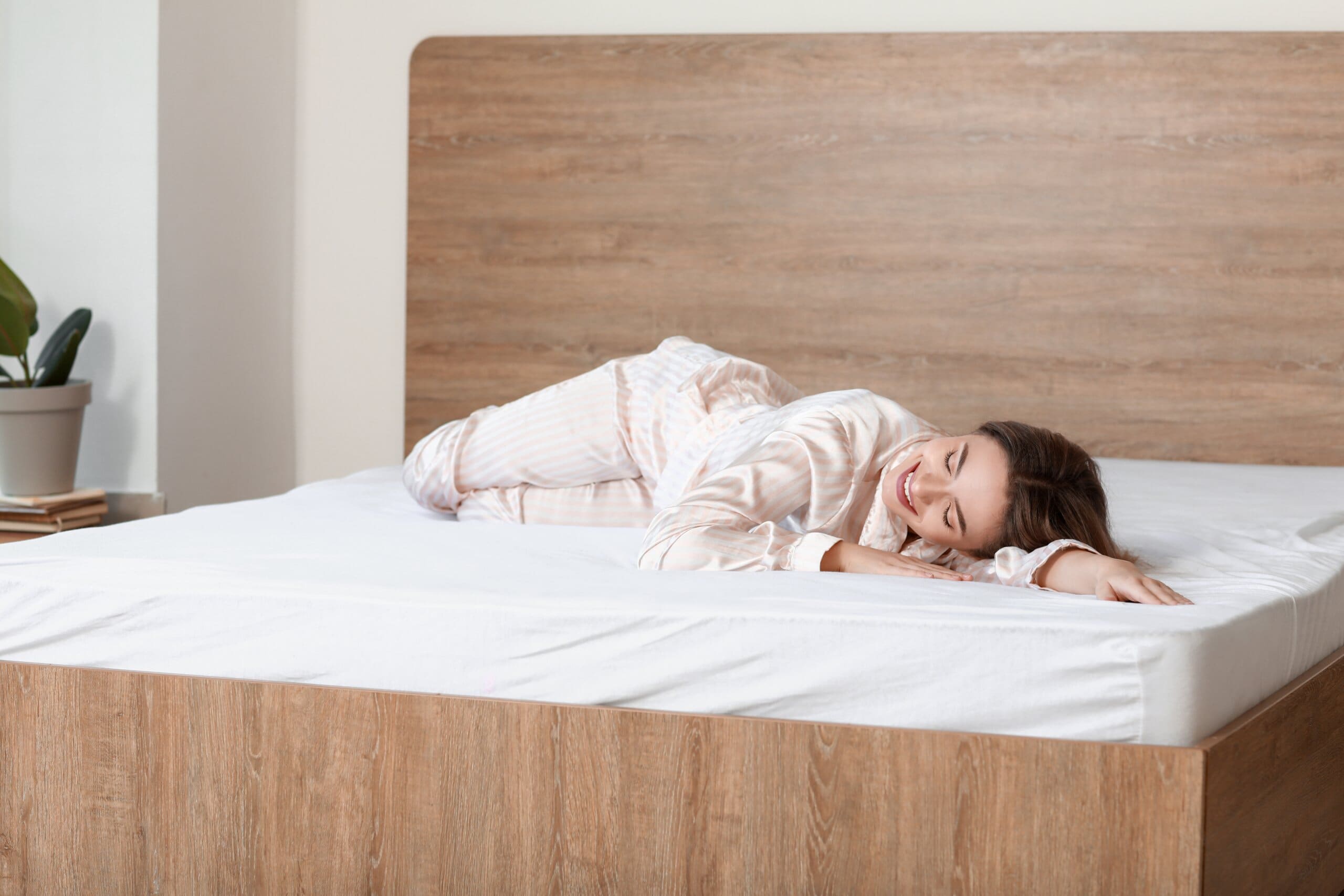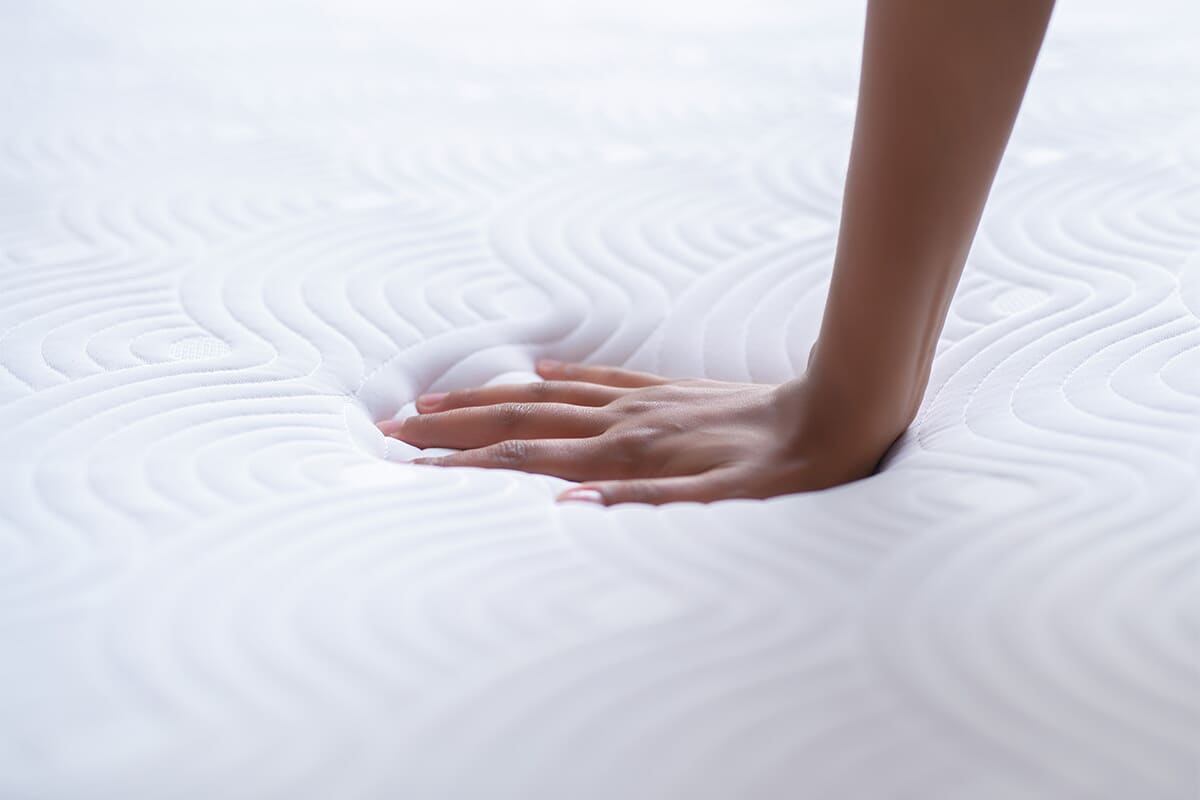Speak to an expert: 0333 0069769
Everything you need to know about a mattress without springs, plus what different types are out there.
Traditionally, mattresses have always had some sort of springs. The springs act as the support layer and without them, the mattress would feel too soft. But as time has gone on, more supportive materials have come to market. Because of this, mattresses are now available without springs at all.
If you are used to a mattress with springs, the thought of a spring-less style might sound strange. However, there are plenty of reasons why you should consider a mattress without springs. Here are the most common questions about springless mattresses answered.
If you've always had a pocket sprung or a coil mattress, even the idea of a spring-less mattress might bring thoughts of back pain. But the truth is many modern mattress materials don't require springs to provide support. Take memory foam for example. The first thing that people often associate this type of mattress with is being soft.
However, foam styles come in all different kinds of densities and firmness levels. All without the help of springs. This is because the material is specially designed to support weight whilst providing a cushioned feel. Eliminating the need for springs and additional comfort fillings like wool.
All mattress types have their benefits. Spring-less mattresses tend to be a popular choice among people who want their mattresses to last longer. This is because foam styles tend to be more durable and deteriorate at a slower rate. Over time, springs lose their ability to bounce back and slowly become compressed.
This leads to the mattress sagging and feeling generally uncomfortable. The same process happens to foam, but it's usually much slower. Of course, this is just a guideline and there are other factors to consider, like quality. Mattress quality will play a huge role in how long it will last. As a guideline, a mattress tends to need to be replaced anywhere between seven and ten years depending on the quality and care taken.
Foam mattresses are also popular among couples. Since foam adapts to the weight placed on it, it provides custom support for each person based on their body weight. It also prevents the transfer of movement. This is great for those who tend to get woken up by their partner moving in the night. Foam is also known to reduce joint pain. Because of its supportive yet soft feel, it relieves a lot of pressure on the joints. This is particularly beneficial if you like to sleep on your side.

Memory foam mattresses with springs tend to be cheaper than complete memory foam. This is because high-quality foam is expensive to produce and is seen as a luxury material. Hybrid mattresses are usually a support layer of springs with a layer of foam on top to provide a soft feel. Many high-quality pocket-sprung mattresses have a memory foam layer and it's a popular choice for those that don't like the sinking feeling that a complete foam mattress gives.
There are benefits to each, but ultimately it comes down to your comfort preferences. Completely memory foam styles aren't to everyone's taste. They can feel quite unusual if you're used to sleeping on a spring mattress. However, foam mattresses are known to help with joint and back pain. Especially if you like to sleep on your side. When sleeping on your side, it puts a lot of pressure on your shoulder and hip joints.
Because of this, it's important to ensure your mattress allows you to sink in so that your spine is straight and aligned. Memory foam is great for allowing you to sink in where you need it, while supporting areas that don't. So, if you find yourself tossing and turning, unable to get comfortable on a spring mattress. Complete memory foam could be a great option.
Un-sprung mattresses are available in all levels of firmness. While it seems unlikely that foam could feel firm, there are plenty of firm options in both latex and memory foam spring-less mattresses. Many brands even offer Orthopaedic firmness in foam options. If you're unsure what mattress firmness is best for you, check out our mattress firmness buying guide.
Spring-less mattresses, as we know, are usually made of foam. But there are different types of foam to suit different sleep needs. Here's what mattresses are available without springs and the benefits they have:
Latex tends to be the most durable of all mattress materials. And because it's naturally found, it's also the most Eco-friendly and easiest to recycle. Because of its dense yet soft feel, it's available in spring-less options. Latex mattresses are a great choice if you'd like the feel of memory foam without the added chemicals.
Memory foam is certainly the market leader when it comes to foam mattresses. Because of its popularity, it's available in plenty of options, including spring-less.
Foam styles tend to be the most popular unsprung mattresses. There are other less common styles available like water, gel, and air.

Take a look at our full range of no spring mattresses for yourself, or read our Memory Foam Mattress Buying Guide to read more about the benefits of this type of mattress.
If you have more questions about no spring mattresses, or any of our mattresses, feel free to contact one of our friendly sleep advisers. We also have plenty of helpful buying guides full of useful information, or use our clever MattressFinder™ quiz to discover your perfect mattress match.